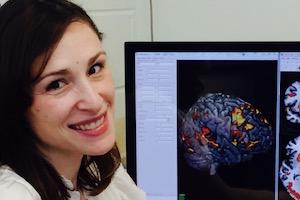Science
Cutting-Edge Brain Research Honored by Association for Psychological Science
Catherine Stoodley named a Fellow at prestigious APS

Associate Professor of Psychology Catherine Stoodley has been elected a fellow of the Association for Psychological Science (APS), the leading international organization dedicated to advancing scientific psychology across disciplinary and geographic borders.
As an APS fellow, Stoodley becomes part of a distinguished group of peers whose work has influenced the field of psychological science in important and lasting ways.
“As a scientist, you always hope that your work has a significant impact on your field, and that what your individual lab is doing will advance our understanding of scientific principles beyond your subfield,” she says. “It is both exciting and humbling to think that my work has been recognized along with such an eminent group of influential scientists.”
Cutting-Edge Research with Clinical Implications
Stoodley’s research on the cerebellum is upending our traditional beliefs about the brain and its role in human health, according to David Haaga, professor of psychology and chair of AU’s Department of Psychology.
“Professor Stoodley is on the forefront of transforming our understanding of the role of the cerebellum in normal and abnormal development,” he says. “The traditional view of the cerebellum restricted its importance to motor functions, but Professor Stoodley’s findings have gone a long way to implicate the cerebellum in thinking and emotion as well.”
Stoodley is continually taking her work in new and exciting directions. In the Stoodley Lab at American University, she combines brain imaging methods with brain modulation methods to help understand what needs to be altered to improve (or restore) brain functioning.
This is cutting-edge research with the possibility of real clinical implications, says Haaga. “The possibilities are exciting, for enhanced language functioning after someone suffers a stroke, or for enhanced social and emotional functioning for people with autism or ADHD.”
A Distinguished Career
Stoodley's research on the cerebellum began during her doctoral research at the University of Oxford, which focused on how basic visual, auditory and motor functions contribute to reading and reading disorders. She has also investigated whether children and adults with developmental dyslexia have difficulty with implicit learning, and whether this is specific to dyslexia or more generally seen in poor readers.
As a postdoctoral research fellow at Massachusetts General Hospital and Harvard Medical School, Stoodley used brain imaging to study the cerebellum and its role in both movement and cognitive processes (such as language and memory).
Now, at American University, Stoodley teaches courses in developmental neuroscience and the brain bases of behavior, and directs the Developmental Neuroscience Lab at AU. In 2018, she received the Morton Bender Prize for Outstanding Scholarship as an Associate Professor. The previous year she received the AU College of Arts and Sciences Dean’s Award for Exceptional Innovation.
Right now, Stoodley is working on several research studies with real-life clinical implications. She is on the verge of completing a research project, funded by the National Institutes of Health (NIH) that looks at the role of cerebellum in autism. In another NIH-funded study, she is working with researchers at Georgetown University to determine if modulation of the cerebellum is effective in improving language outcomes after a stroke. And, along with researchers at National Children’s Medical Center, Stoodley is looking at the role of the cerebellum in long-term outcomes in pre-term babies. “This is basic science that has a lot of clinical implications,” she says.
An Honor and an Opportunity
Stoodley looks at the fellowship at the Association for Psychological Science as an opportunity to present her work to larger audiences and to make a greater impact in the field of psychological science.
“It also gives me hope that this work will eventually impact clinical assessment and treatment to improve the lives of individuals with clinical disorders—the ultimate goal of psychological science.”

